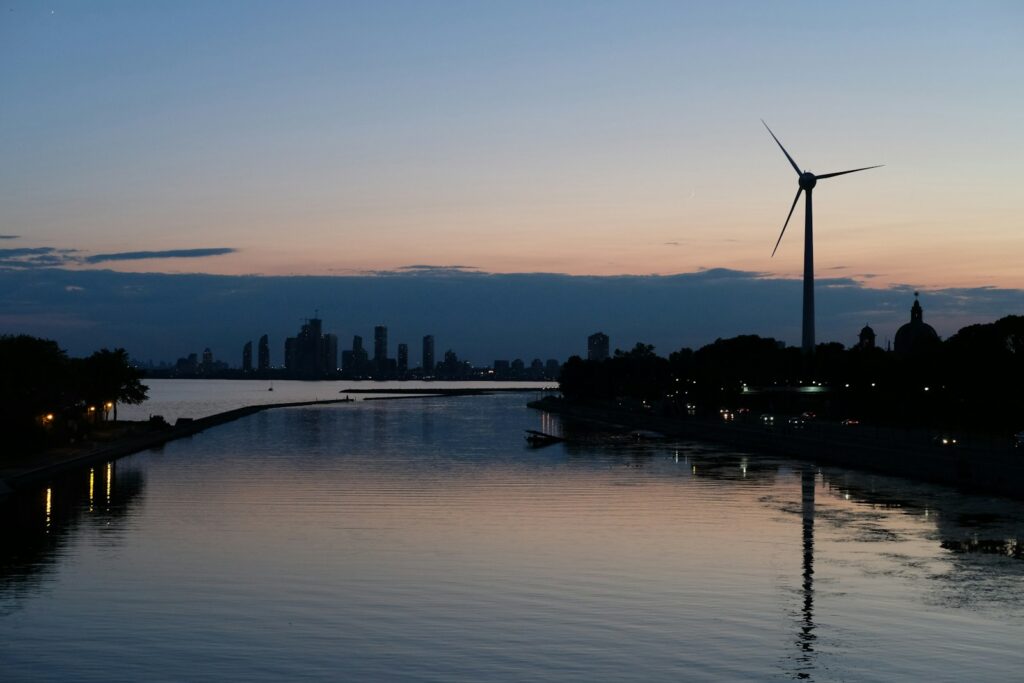Manchester could be at risk of missing its 2038 target to become net-zero according to Megan Haslam, Sustainability Manager at Sir Robert McAlpine. She writes for Environment Journal, explaining how nature-based solutions and urban greening could be the answer.
This October Greater Manchester held its 5th annual Green Summit. It was a day for reflecting on successes, including the opening of Mayfield Park, Manchester’s first green public park in over 100 years, and a call for further action. A key message, particularly from the younger speakers, was that climate change and biodiversity loss aren’t ‘future problems’ – action is required urgently.
Despite lots of promising discussion, a dark cloud loomed. The city-region is at growing risk of failing to meet its 2038 net zero target (just one microcosm of the current projections that the UK will miss its 2050 date). Debate around greener transport, greener buildings & greener businesses was encouraging however the narrative of nature-based solutions and biodiversity (the real green stuff) was lost against the headline villain: carbon. That being said, restoring natural ecosystems is the most efficient and effective solution to removing CO2 from the atmosphere. Solely lessening our future impact is not enough at this point.
In fairness, Greater Manchester has established a leading voice for nature, having declared a ‘biodiversity emergency’ in March and signed a statement of intent which calls for action to reverse biodiversity loss. Biodiversity loss and the breakdown of fragile ecosystems is the root cause of many current crises we are facing: cost of living, energy, food scarcity, displacement, air quality, pollution, health & wellbeing, carbon emissions, extreme weather events and climate change.
Urbanisation is acknowledged as one of the biggest threats to biodiversity and in a twist of fate, nature is imposing its own threat to the urban environment through the effects of climate change. Ultimately, cities such as Manchester are under a great pressure to adapt and mitigate further damage to the planet.
Vulnerable Cities
Today, more than 55% of the world’s population live in cities, yet cities like Manchester are especially vulnerable to the effects of climate change due to their lack of natural resilience. Buildings, roads and paving materials store heat and re-radiate, causing the ‘Urban Heat Island’ effect. This poses a risk to human health, particularly for vulnerable groups and especially when in combination with rising temperatures caused by global warming, such as this summer’s record-breaking heatwaves. Urban areas also have higher vulnerability to flash flooding due to the ratio of hard surfaces to permeable ground or plant infiltration opportunities.
At the same time, cities are key contributors to the emission of greenhouse gases and other sources of air pollution, having a direct impact on quality of life for urban populations. Adaptation interventions are urgently needed to strengthen resilience to climate change, increase the ecological value of space and enhance the city for residents. So far, whilst huge strides have been made within the wider suburban areas of Greater Manchester, the city centre itself has continued to allow urban development with little to no increase or benefit to biodiversity.
Urban Greening is essential to climate and biodiversity recovery
The Environment Act’s requirement for all planning permissions to be subject to the approval of a biodiversity plan detailing biodiversity net gain of at least 10% will come into force in November 2023, but we cannot afford to wait another year for action.
There is growing recognition amongst policymakers that the challenges of climate change and biodiversity loss are interwoven and must be tackled together. We cannot solve one without the other and need to look at holistic solutions rather than tackling each crisis in isolation, risking inadvertently aggravating another.
Nature based solutions is an umbrella term for a variety of actions that tackle the climate crisis using natural initiatives such as afforestation, rewilding and urban greening. The UK needs more of the latter. To recover biodiversity and climate stability, Manchester must focus on greening the city.
As cities have developed into intensely populated urban areas, natural ecosystems have been fragmented or destroyed. Records from the Greater Manchester Ecology Unit evidence local species declines in birds (40% decline in red poll, 33% decline in skylarks, 32% decline in tree sparrows) and mammals (rabbits 64% decline, red fox 44%, brown hare 35%). Hidden behind these numbers are likely more devastating declines in insects. These dramatic changes have been caused by habitats being destroyed, fragmented and becoming less biodiverse. The UK’s cities are severely nature depleted and as a result, we live in one of the least biodiverse countries in the world – the bottom 10% globally.
Nature is disappearing, but cities like Manchester can perform a vital role in its return by ensuring the success of the ‘Nature Recovery Network’, supported by The Wildlife Trust, Defra, Natural England and the UK Government. Whilst cities are unlikely to rival nature reserves in terms of wildlife abundance and biodiversity, they can play an important role in enabling nature to connect through green corridors and function as part of this national network of wild-life rich spaces, rather than in isolated pockets.
It is essential we rethink urban development in this way. The built environment and the natural environment don’t have to be two extremes, incapable of existing together; it is possible to achieve a biodiverse, urban environment. Manchester holds the potential to nurture unique ecosystems crucial to our quality of life on the planet by contributing to air and water quality, regulating temperatures and providing space to rest and enjoy. Research from The Wildlife Trust even suggests that certain species, such as bees, prefer to live in our cities and suburbs when they have access to gardens and allotments providing ‘pollinator hotspots’. Small birds can also benefit from living nearby to human populations where they are able to take advantage of gardens and bird feeders.
Making Manchester Wild
Manchester has challenges ahead – reversing its biodiversity emergency, meeting its 2038 net zero target and building resilience to the growing impacts of climate change.
These challenges provide opportunities. The opportunity for policy makers, developers, and contractors to work together and enlist nature too. Urban greening will significantly support cities like Manchester in addressing a broad range of sustainability challenges. With focussed and passionate action, we can transform our cities into carbon sinks, circular economy hubs, green corridors and a space to connect people with nature. Too long we have viewed cities and the countryside as opposing states. It’s well past time we extend the friendly hospitality of our cities like Manchester to the natural world.
Photos by Matthew Waring and Kateryna Tyshkul
















